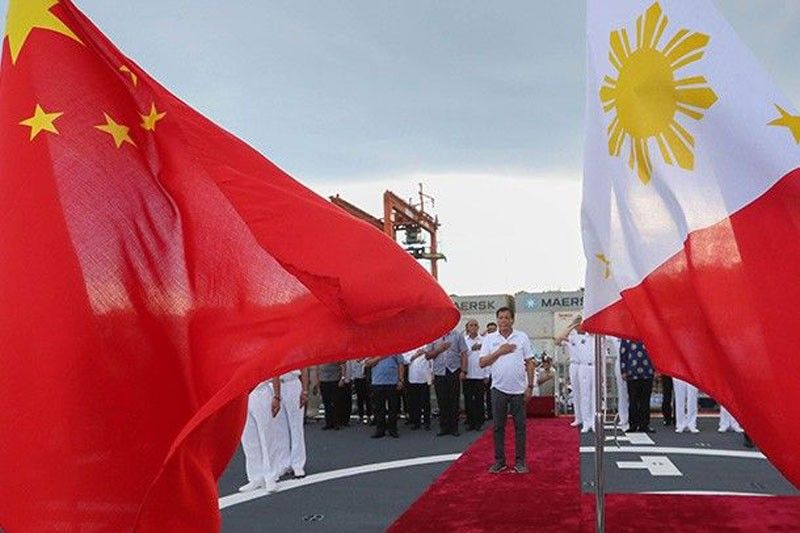
“The defense department looks forward to working more with our counterparts in the PLA to arrive at mutually beneficial agreements and mechanisms for exchange, increase opportunities for cooperation and fostering greater understanding between our two countries,” DND Undersecretary Cardozo Luna said during the PLA’s 91st founding anniversary celebration at Shangri-la Hotel in Makati City.
With improved relations between the Philippines and China, the Department of National Defense (DND) is looking forward to working with the People’s Liberation Army (PLA), a senior defense official has said last Friday.
“The defense department looks forward to working more with our counterparts in the PLA to arrive at mutually beneficial agreements and mechanisms for exchange, increase opportunities for cooperation and fostering greater understanding between our two countries,” DND Undersecretary Cardozo Luna said during the PLA’s 91st founding anniversary celebration at Shangri-la Hotel in Makati City.
Luna also noted that in the past few years, the Philippines and China have made significant gains in the field of defense cooperation as well as military-to-military engagements between the Armed Forces of the Philippines (AFP) and the PLA.
“We tackled areas of mutual concern such combatting terrorism, violent extremism and transnational crimes, the conduct of humanitarian assistance and disaster response and resolving disputes through peaceful means and open channels of communication at all levels,” he said.
For his part, Chinese Ambassador Zhao Jianhua underscored that a favorable international environment of peace and stability is of crucial significance to China’s success, and it is something that Beijing will always “bear in mind.”
“The PLA will continue to contribute to peace, stability and prosperity,” Zhao stressed.
As this developed, Admiral Philip Davidson, head of the US Indo-Pacific Command, has called for an increase in navy, army and air force presence in the Indo-Pacific to deter Chinese aggression, with China now effectively able to control the South China Sea (SCS).
Davidson has also warned that the PLA will be able to use China’s SCS bases to challenge US presence in the region and any forces deployed to the islands would easily overwhelm the military forces of any of the other SCS-claimants.
“We tackled areas of mutual concern such combatting terrorism, violent extremism and transnational crimes, the conduct of humanitarian assistance and disaster response and resolving disputes through peaceful means and open channels of communication at all levels,” he said.
For his part, Chinese Ambassador Zhao Jianhua underscored that a favorable international environment of peace and stability is of crucial significance to China’s success, and it is something that Beijing will always “bear in mind.”
“The PLA will continue to contribute to peace, stability and prosperity,” Zhao stressed.
As this developed, Admiral Philip Davidson, head of the US Indo-Pacific Command, has called for an increase in navy, army and air force presence in the Indo-Pacific to deter Chinese aggression, with China now effectively able to control the South China Sea (SCS).
Davidson has also warned that the PLA will be able to use China’s SCS bases to challenge US presence in the region and any forces deployed to the islands would easily overwhelm the military forces of any of the other SCS-claimants.
But Zhao emphasized that the turnaround and betterment of Philippines-China relations and development has contributed to effective military-to-military exchanges and cooperation between the two countries.
“The past two years also witnessed increasing exchanges of visits at various levels and training programs between our two armed forces and military academies,” Zhao said.
The ambassador said China last year provided two batches of weapons and ammunition to the Philippines’ campaign against terrorism in Marawi. The third batch of assistance was turned over last week to the Philippines, sustaining China’s support to neutralize terrorism and violent extremism.
“These gratifying developments in our (relations) stand testimony to an overall picture of China-Philippines partnership,” Zhao added.
“Within a short span of two years, under the visionary guidance of our two leaders, China-Philippines relations have ushered in a new era featuring strengthened high-level exchanges, enhanced political mutual trust, expansive practical cooperation in trade, investment, infrastructure, tourism, agriculture, fisheries, poverty-alleviation, anti-terrorism, law-enforcement and people-to-people exchanges,” he said.
The Philippines and China, he said, are determined to “level up our friendship and partnership” and bring more tangible benefits.
“We do have our differences, but both countries agree to manage them through dialogues and consultations, so as to make sure the small percentage of disputes does not jeopardize the growth of our overall relationship and cooperation,” he said.
“The past two years also witnessed increasing exchanges of visits at various levels and training programs between our two armed forces and military academies,” Zhao said.
The ambassador said China last year provided two batches of weapons and ammunition to the Philippines’ campaign against terrorism in Marawi. The third batch of assistance was turned over last week to the Philippines, sustaining China’s support to neutralize terrorism and violent extremism.
“These gratifying developments in our (relations) stand testimony to an overall picture of China-Philippines partnership,” Zhao added.
“Within a short span of two years, under the visionary guidance of our two leaders, China-Philippines relations have ushered in a new era featuring strengthened high-level exchanges, enhanced political mutual trust, expansive practical cooperation in trade, investment, infrastructure, tourism, agriculture, fisheries, poverty-alleviation, anti-terrorism, law-enforcement and people-to-people exchanges,” he said.
The Philippines and China, he said, are determined to “level up our friendship and partnership” and bring more tangible benefits.
“We do have our differences, but both countries agree to manage them through dialogues and consultations, so as to make sure the small percentage of disputes does not jeopardize the growth of our overall relationship and cooperation,” he said.

No comments:
Post a Comment
Note: Only a member of this blog may post a comment.